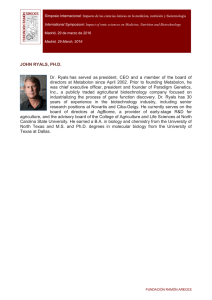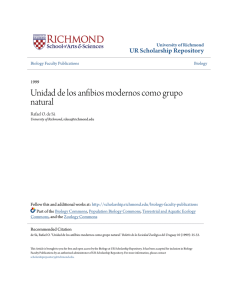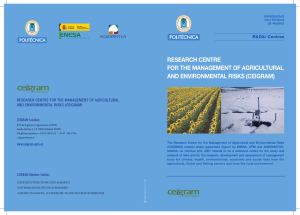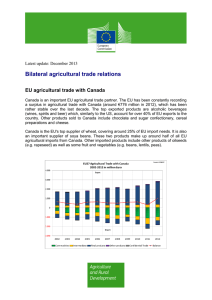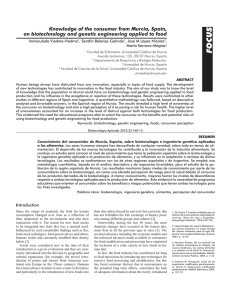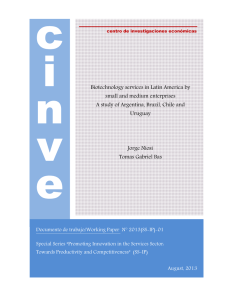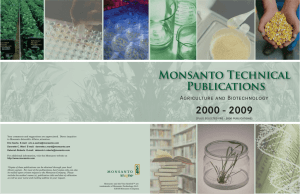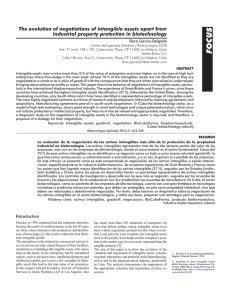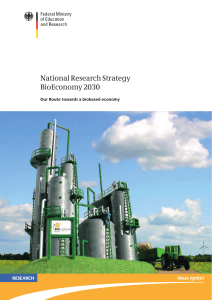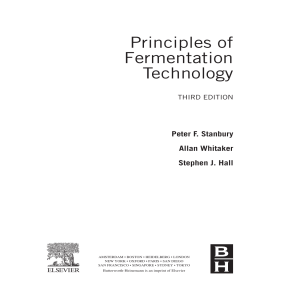1. Natural sciences
Anuncio
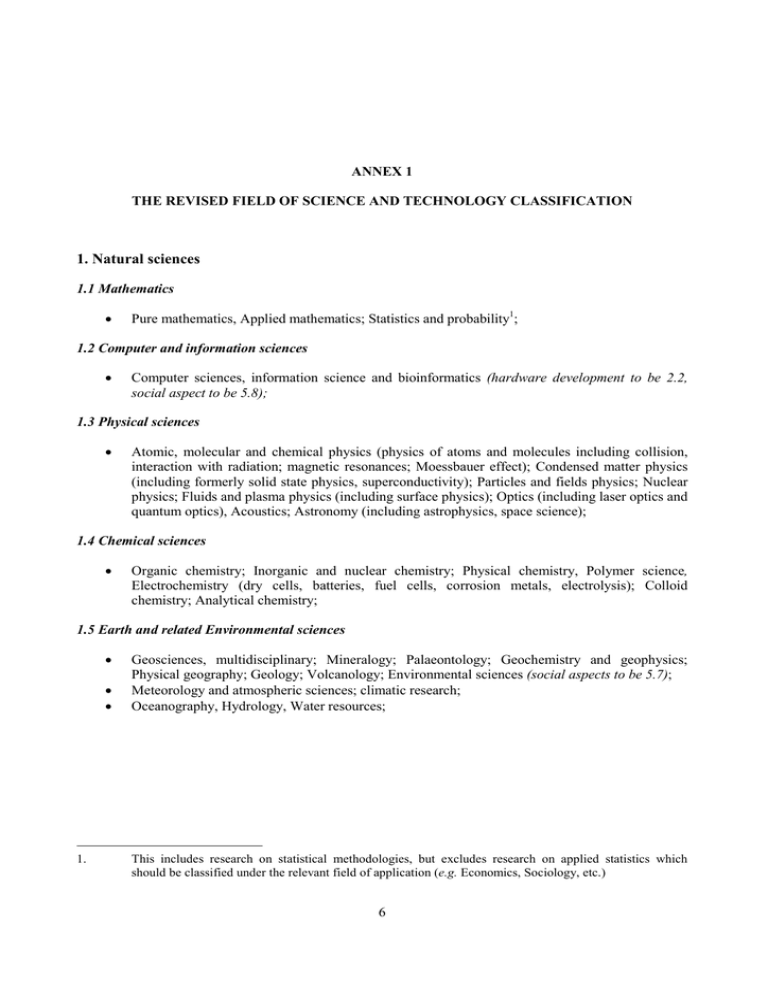
ANNEX 1 THE REVISED FIELD OF SCIENCE AND TECHNOLOGY CLASSIFICATION 1. Natural sciences 1.1 Mathematics • Pure mathematics, Applied mathematics; Statistics and probability1; 1.2 Computer and information sciences • Computer sciences, information science and bioinformatics (hardware development to be 2.2, social aspect to be 5.8); 1.3 Physical sciences • Atomic, molecular and chemical physics (physics of atoms and molecules including collision, interaction with radiation; magnetic resonances; Moessbauer effect); Condensed matter physics (including formerly solid state physics, superconductivity); Particles and fields physics; Nuclear physics; Fluids and plasma physics (including surface physics); Optics (including laser optics and quantum optics), Acoustics; Astronomy (including astrophysics, space science); 1.4 Chemical sciences • Organic chemistry; Inorganic and nuclear chemistry; Physical chemistry, Polymer science, Electrochemistry (dry cells, batteries, fuel cells, corrosion metals, electrolysis); Colloid chemistry; Analytical chemistry; 1.5 Earth and related Environmental sciences • • • 1. Geosciences, multidisciplinary; Mineralogy; Palaeontology; Geochemistry and geophysics; Physical geography; Geology; Volcanology; Environmental sciences (social aspects to be 5.7); Meteorology and atmospheric sciences; climatic research; Oceanography, Hydrology, Water resources; This includes research on statistical methodologies, but excludes research on applied statistics which should be classified under the relevant field of application (e.g. Economics, Sociology, etc.) 6 1.6 Biological sciences (Medical to be 3, and Agricultural to be 4) • • • • • • Cell biology, Microbiology; Virology; Biochemistry and molecular biology; Biochemical research methods; Mycology; Biophysics; Genetics and heredity (medical genetics to be 3); reproductive biology (medical aspects to be 3); developmental biology; Plant sciences, botany; Zoology, Ornithology, Entomology, Behavioural sciences biology; Marine biology, freshwater biology, limnology; Ecology; Biodiversity conservation; Biology (theoretical, mathematical, thermal, cryobiology, biological rhythm), Evolutionary biology; other biological topics; 1.7 Other natural sciences 2. Engineering and technology 2.1 Civil engineering • Civil engineering; Architecture engineering; Construction engineering, Municipal and structural engineering; Transport engineering; 2.2 Electrical engineering, Electronic engineering, Information engineering • Electrical and electronic engineering; Robotics and automatic control; Automation and control systems; Communication engineering and systems; telecommunications; Computer hardware and architecture; 2.3 Mechanical engineering • • • • Mechanical engineering; Applied mechanics; Thermodynamics; Aerospace engineering; Nuclear related engineering; (nuclear physics to be 1.3); Audio engineering, reliability analysis; 2.4 Chemical engineering • Chemical engineering (plants, products); Chemical process engineering; 2.5 Materials engineering • Materials engineering; Ceramics; Coating and films; Composites (including laminates, reinforced plastics, cermets, combined natural and synthetic fibre fabrics; filled composites); Paper and wood; textiles; including synthetic dyes, colours, fibres; (nanoscale materials to be 2.10; biomaterials to be 2.9); 2.6 Medical engineering • Medical engineering; Medical laboratory technology (including laboratory samples analysis; diagnostic technologies); (Biomaterials to be 2.9 [physical characteristics of living material as related to medical implants, devices, sensors]); 7 2.7 Environmental engineering • Environmental and geological engineering, geotechnics; Petroleum engineering, (fuel, oils), Energy and fuels; Remote sensing; Mining and mineral processing; Marine engineering, sea vessels; Ocean engineering; 2.8 Environmental biotechnology • Environmental biotechnology; Bioremediation, diagnostic biotechnologies (DNA chips and biosensing devices) in environmental management; environmental biotechnology related ethics; 2.9 Industrial biotechnology • Industrial biotechnology; Bioprocessing technologies (industrial processes relying on biological agents to drive the process) biocatalysis, fermentation; bioproducts (products that are manufactured using biological material as feedstock) biomaterials, bioplastics, biofuels, bioderived bulk and fine chemicals, bio-derived novel materials; 2.10 Nano-technology • • Nano-materials [production and properties]; Nano-processes [applications on nano-scale]; (biomaterials to be 2.9); 2.11 Other engineering and technologies • • Food and beverages; Other engineering and technologies; 3. Medical and Health sciences 3.1 Basic medicine • Anatomy and morphology (plant science to be 1.6); Human genetics; Immunology; Neurosciences (including psychophysiology); Pharmacology and pharmacy; Medicinal chemistry; Toxicology; Physiology (including cytology); Pathology; 3.2 Clinical medicine • Andrology; Obstetrics and gynaecology; Paediatrics; Cardiac and Cardiovascular systems; Peripheral vascular disease; Hematology; Respiratory systems; Critical care medicine and Emergency medicine; Anaesthesiology; Orthopaedics; Surgery; Radiology, nuclear medicine and medical imaging; Transplantation; Dentistry, oral surgery and medicine; Dermatology and venereal diseases; Allergy; Rheumatology; Endocrinology and metabolism (including diabetes, hormones); Gastroenterology and hepatology; Urology and nephrology; Oncology; Ophthalmology; Otorhinolaryngology; Psychiatry; Clinical neurology; Geriatrics and gerontology; General and internal medicine; other clinical medicine subjects; Integrative and complementary medicine (alternative practice systems); 8 3.3 Health sciences • • • • • Health care sciences and services (including hospital administration, health care financing); Health policy and services; Nursing; Nutrition, Dietetics; Public and environmental health; Tropical medicine; Parasitology; Infectious diseases; epidemiology; Occupational health; Sport and fitness sciences; Social biomedical sciences (includes family planning, sexual health, psycho-oncology, political and social effects of biomedical research); Medical ethics; Substance abuse; 3.4 Medical biotechnology • Health-related biotechnology; Technologies involving the manipulation of cells, tissues, organs or the whole organism (assisted reproduction); Technologies involving identifying the functioning of DNA, proteins and enzymes and how they influence the onset of disease and maintenance of well-being (gene-based diagnostics and therapeutic interventions (pharmacogenomics, gene-based therapeutics); Biomaterials (as related to medical implants, devices, sensors); Medical biotechnology related ethics; 3.5 Other medical sciences • • Forensic science Other medical sciences 4. Agricultural sciences 4.1 Agriculture, Forestry, and Fisheries • Agriculture; Forestry; Fishery; Soil science; Horticulture, viticulture; Agronomy, plant breeding and plant protection; (Agricultural biotechnology to be 4.4) 4.2 Animal and Dairy science • • Animal and dairy science; (Animal biotechnology to be 4.4) Husbandry; Pets; 4.3 Veterinary science 4.4 Agricultural biotechnology • Agricultural biotechnology and food biotechnology; GM technology (crops and livestock), livestock cloning, marker assisted selection, diagnostics (DNA chips and biosensing devices for the early/accurate detection of diseases) biomass feedstock production technologies, biopharming; agricultural biotechnology related ethics; 9 4.5 Other agricultural sciences 5. Social sciences 5.1 Psychology • • Psychology (including human - machine relations); Psychology, special (including therapy for learning, speech, hearing, visual and other physical and mental disabilities); 5.2 Economics and Business • • Economics, Econometrics; Industrial relations; Business and Management; 5.3 Educational sciences • • Education, general; including training, pedagogy, didactics; Education, special (to gifted persons, those with learning disabilities); 5.4 Sociology • • Sociology; Demography; Anthropology, ethnology, Social topics (Women’s and gender studies; Social issues; Family studies, Social work); 5.5 Law • Law, criminology, penology; 5.6 Political science • Political science; public administration; organisation theory; 5.7 Social and economic geography • Environmental sciences (social aspects); Cultural and economic geography; Urban studies (Planning and development); Transport planning and social aspects of transport (transport engineering to be 2.1); 5.8 Media and communications • Journalism; Information science (social aspects); Library science; Media and socio-cultural communication; 5.9 Other social sciences • • Social sciences, interdisciplinary; Other social sciences; 10 6. Humanities 6.1 History and Archaeology • History (history of science and technology to be 6.3, history of specific sciences to be under the respective headings); Archaeology; 6.2 Languages and Literature • General language studies; Specific languages; General literature studies; Literary theory; Specific literatures; Linguistics; 6.3 Philosophy, Ethics and Religion • • Philosophy, History and philosophy of science and technology; Ethics (except ethics related to specific subfields); Theology; Religious studies; 6.4 Arts (arts, history of arts, performing arts, music) • • Arts, Art history; Architectural design; Performing arts studies (Musicology, Theater science, Dramaturgy); Folklore studies; Studies on Film, Radio and Television; 6.5 Other humanities 11
